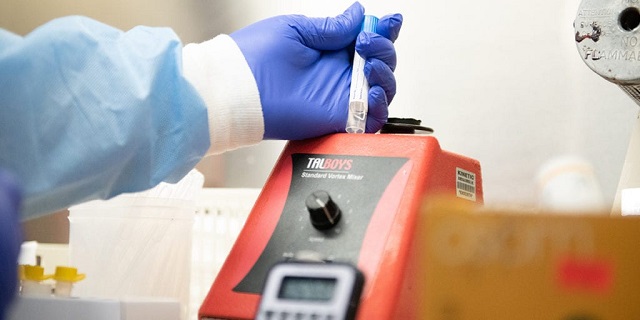COVID-19 Antibody Testing: Pros & Cons

May 02, 2020
Many people are interested in finding out if they were previously infected with COVID-19. An antibody test (now more widely available) can provide that answer. But before you run out to get the test, it’s important to understand the pros and cons.
What is antibody testing?
Antibody testing (also referred to as serological testing) is a blood test that can detect if you were previously infected with COVID-19. The presence of specific antibodies suggests that you have been exposed and your body developed the blood proteins needed to fight the infection. The antibody test may not be able to show current presence of the virus (like you might experience with a nasal or throat swab test) because it can take 1-3 weeks to develop antibodies after symptoms occur.
Pros:
There are a few ways antibody testing can be valuable:
- To know your status: Research suggests that many who are infected COVID-19 show no or mild signs and symptoms of illness, so antibody tests could be useful in determining if you had it without knowing. Antibody test results could also help guide your doctor in making clinical decisions about your care.
- To understand disease prevalence: Widespread antibody testing could give researchers a better understanding of how many people have been infected and how deadly the virus really is. Researchers can use this data to predict how COVID-19 might affect us in the future, including why some people are more severely impacted than others.
- For convalescent plasma therapy: Convalescent plasma therapy uses the blood and antibodies from recovered COVID-19 patients to help treat others with COVID-19. Hackensack University Medical Center’s convalescent plasma therapy clinical trial, for example, uses the blood of COVID-19 survivors who have a very large presence of antibodies. Testing is needed to make this determination.
- To help develop a vaccine: When a vaccine is developed, it imitates a certain infection, and once injected, it helps build up the body’s natural defense against the infection, creating immunity to the disease. Part of that defense includes the production of antibodies. Testing is needed to verify the body’s response to a potential vaccine.
Cons:
There are three main concerns with antibody testing:
- Quality: There are several different antibody tests for COVID-19. Some perform better than others, and most tests are still being evaluated by the U.S. Food and Drug Administration (FDA). Some things to consider: It is possible to be exposed to COVID-19 and not develop antibodies. With low quality tests, it is also possible to receive a “false positive” because you had another type of virus.
- False Sense of Immunity: Some people think having COVID-19 antibodies means they are immune to the virus and won’t catch it again. There is currently no evidence to suggest that people who have recovered from COVID-19 are immune to catching it again. Until more research is done, you should still take proper precautions to prevent further spread of the virus if you receive a positive COVID-19 antibody test result.
- Active Infections: If you test negative for COVID-19 antibodies, it doesn’t rule out the chance that you could have an active infection and haven’t built up the antibodies against it yet. This means that you could be spreading the virus to others without knowing it.
Where can I get an antibody test for COVID-19?
If you feel like antibody testing is right for you, you can get testing done at Hackensack Meridian Health’s Urgent Care locations. Call before coming in to make sure you are a candidate for testing, including having no current signs or symptoms of COVID-19. If you’re unsure, speak to your health care provider to determine if it makes sense for you to get tested.
How are antibody tests performed?
Antibody tests are blood tests that are either conducted by a finger prick or blood draw. The blood is then inspected for two types of antibodies: IgM (which develop early on in an infection) and IgG (which are more likely to be detected after you’ve recovered). If IgG is detected, it is more likely that you’ve built up some immunity than if IgM alone was detected.
IgM tests are rapid (and taken by finger prick) and results will be available in 10-15 minutes. IgG test results require blood to be drawn and need to be sent to a lab. IgG tests can take up to 7 days to get results. Hackensack Meridian Health facilities are only providing IgG blood draw tests because it is more reliable and accurate than IgM rapid tests.
Next Steps & Resources
- Call an Urgent Care Center to see if you’re a candidate for COVID-19 antibody testing.
- To make an appointment with a doctor near you, call 800-822-8905 or visit our website.
The material provided through HealthU is intended to be used as general information only and should not replace the advice of your physician. Always consult your physician for individual care.
Find a doctor near me
I Think I Have Coronavirus, Now What?

Coronavirus symptoms? Learn how to protect yourself and others. Get expert advice; call 800-822-8905 or use telemedicine.
How to Prepare for Your COVID-19 Vaccine

Prepare for your COVID-19 vaccine. Learn how to schedule your appointment, what to wear, and what to bring. Get vaccinated today.
Find a doctor near me

How to Prepare for a COVID Test
Prepare for your COVID-19 test. Find testing sites, learn what to bring, and avoid common mistakes. Get helpful tips for a smoother experience.

What Can You Do After You’re Fully Vaccinated Against COVID?
There are advantages to getting fully vaccinated against COVID-19.

Recovered from COVID-19? Why You Still Need a Vaccine
Dr. Thomas Bader has answered common questions about the COVID-19 vaccine that you may have if you’ve already experienced the illness

What Are COVID-19 Vaccine Side Effects, and How Long Do They Last?
Here are answers to questions that you may have about COVID-19 vaccine side effects.
